- News
- Reviews
- Bikes
- Components
- Bar tape & grips
- Bottom brackets
- Brake & gear cables
- Brake & STI levers
- Brake pads & spares
- Brakes
- Cassettes & freewheels
- Chains
- Chainsets & chainrings
- Derailleurs - front
- Derailleurs - rear
- Forks
- Gear levers & shifters
- Groupsets
- Handlebars & extensions
- Headsets
- Hubs
- Inner tubes
- Pedals
- Quick releases & skewers
- Saddles
- Seatposts
- Stems
- Wheels
- Tyres
- Tubeless valves
- Accessories
- Accessories - misc
- Computer mounts
- Bags
- Bar ends
- Bike bags & cases
- Bottle cages
- Bottles
- Cameras
- Car racks
- Child seats
- Computers
- Glasses
- GPS units
- Helmets
- Lights - front
- Lights - rear
- Lights - sets
- Locks
- Mirrors
- Mudguards
- Racks
- Pumps & CO2 inflators
- Puncture kits
- Reflectives
- Smart watches
- Stands and racks
- Trailers
- Clothing
- Health, fitness and nutrition
- Tools and workshop
- Miscellaneous
- Buyers Guides
- Features
- Forum
- Recommends
- Podcast
review
£229.99
VERDICT:
Powerful, durable light with a multitude of uses, though the separate battery adds complexity
Powerful light
Remote is handy
Battery life is good
Bulky battery
Lead could be longer
Extension cable not included
Weight:
253g
Contact:
At road.cc every product is thoroughly tested for as long as it takes to get a proper insight into how well it works. Our reviewers are experienced cyclists that we trust to be objective. While we strive to ensure that opinions expressed are backed up by facts, reviews are by their nature an informed opinion, not a definitive verdict. We don't intentionally try to break anything (except locks) but we do try to look for weak points in any design. The overall score is not just an average of the other scores: it reflects both a product's function and value – with value determined by how a product compares with items of similar spec, quality, and price.
What the road.cc scores meanGood scores are more common than bad, because fortunately good products are more common than bad.
- Exceptional
- Excellent
- Very Good
- Good
- Quite good
- Average
- Not so good
- Poor
- Bad
- Appalling
The Gemini Duo 2200 Multisport Front Light is a powerful offering that is good enough for use on the trails and for lighting your way on the road. It really pumps out the lumens, all from a comparatively small head unit, although the fact that the battery pack is quite bulky might put some off.
You can divide lights into those designed to be seen and those for seeing with. This Gemini is firmly in the latter category, pumping out 2,200 lumens, which is more than enough to light even the roughest off-road trail.
> Find your nearest dealer here
All of this is done through a small unit that can be attached to your bar, your helmet, or even worn on a head strap. As the name suggests, this light has a variety of uses – I even found myself using it while crawling around under the floorboards during the review period. Gemini is quick to highlight that this isn't simply a bike light but is very much designed for multiple sports.
Rather than relying on an internal battery the Gemini has a separate battery pack, which is about half the size of a pack of cards. I used the included Velcro strap to hold it in place underneath my stem, which kept it out of the way, although it is a bit bulky. Finding the ideal spot is made a little more complex by the wire, which is only around 12 inches long and needs to be connected to the light without being permanently strapped to the frame.
This also made it less appealing to use mounted on a helmet. Although the head/light unit itself isn't hugely heavy, the length of the lead means the battery has to sit on the helmet too (you can't store it in a pocket, for example). The weight of the battery isn't enough to give you neckache, but you certainly notice it. You can buy an extension cable for around a tenner, which gives you an extra 70cm to play with, so you could keep the battery in a bag or a jersey pocket.
Attaching the light to the handlebar is done through a simple rubber loop that sits on hooks either side of the head unit. I found that this kept the light in place over rough surfaces and it never threatened to come loose. All good there!
With the battery, the entire unit comes in at 253g – not light, but still lighter than some powerful integrated lights such as the Exposure MaXx-D MK11, which pumps out more lumens (3,300) but weighs 80g more (and costs another £155).
Modes and run-times
Battery life is impressive: 2 hours for the maximum 2,200-lumen solid beam, 4.5hrs for medium (1,100 lumens), and 22 for low (220 lumens). Out of the box there is perhaps a little too much disparity between the medium and low settings, but handily you can reprogram the modes using the single button on the back, so you could pump up the output on low or lower the output on medium, for example. All the modes are programmable with 10 different brightness levels; it takes a little bit of practice to get it right, but after a few attempts it's relatively simple.
There are also two flash modes, with run-times of 4 hours on the maximum output flash and 21.5 hours for the lowest setting.
Changing modes is done in one of two ways: either pressing the one button on the back for different lengths of time, or using the included remote. The remote is a really neat feature as it allows you to not only shift through the modes, but also lets you dip your light, something that is necessary on the road given the power of this thing.
The remote is simple to connect – you just need to press the buttons on the remote within 30 seconds of connecting the battery to the light.
Performance
I used the light almost exclusively for road riding and found it more than adequate for most situations. The beam pattern is pretty much a perfect circle in front of you; it means you can see what's exactly in front from far off, but you perhaps don't see as much laterally as with some other lights. Personally, I didn't feel I was missing much compared to when using a wider beam; I found that I could cycle faster with more confidence because I could see further – I could see potholes coming up with more than enough time to adjust, for instance – though I was aware that there are no side windows to help with visibility at junctions or with vehicles approaching from the side.
I didn't really use it too much off-road, but I can see this working just as well for gravel or even mountain biking in the dark. I'd suggest saving the helmet mount for riding off-road and on gravel because it's easy to dazzle other road users with powerful helmet-mounted lights.
Like many, the single button on the back of the light also works as a battery level indicator through a coloured LED that goes through green, amber and red. On the battery pack itself five LEDS indicate the level of charge, to give you a little more accuracy.
Charging is done through a USB to USB-C cable and takes around five hours from empty when plugged into the wall, longer through a laptop.
When it's not being used to power your lights, you can use the battery to charge your devices using a USB-C cable.
Value and conclusion
An RRP of £229.99 is a lot of money for a bike light, of course. The Gemini Duo 2200 Multisport does have a multitude of uses, though, which goes some way to justifying that price. You can also pay more – a quick look at this year's beam comparison shows a few Exposures that are more expensive (the Strada SL is the closest in price at £210, with a max output of 900 lumens), and the Lumicycle Apogee is £419.99.
> Buyer's Guide: The best 2019/2020 front lights for cycling
Overall, there is no doubt that this is a more than powerful enough light for a multitude of uses, and the remote works brilliantly. The fact that the head unit and the battery are separate makes mounting a little more complicated than with a self-contained light but this is still a strong proposition.
Verdict
Powerful, durable light with a multitude of uses, though the separate battery adds complexity
road.cc test report
Make and model: Gemini Duo 2200 Multisport Front Light
Size tested: Max 2,200 lumens
Tell us what the light is for, and who it's aimed at. What do the manufacturers say about it? How does that compare to your own feelings about it?
It is a powerful wearable light that can be used across multiple different sports.
Gemini says, 'The Duo 2200 Multisport is designed to be your primary go-to light for all headlamp needs.'
Off the bike I found this light really useful as a headlamp although, personally, I found it a little too bulky to be put on a helmet for road use. It performed well when mounted on the bars.
Tell us some more about the technical aspects of the light?
Gemini lists:
Brightness
2200 Lumens
Battery
30Wh 2-Cell Battery
Weight
60g Duo Light Head
190g 2-Cell Battery
Modes
Low / Med / High / Flash
All programmable to ten brightness levels
Material
Hard Anodized Aluminum
Safety
LED Thermal Protection
Charging Protection
Low Battery Warning
In the Box
Duo Light Head
30Wh 2-Cell Battery
USB Charger 10W
USB Charging Cable
Built-in Handlebar Mount
Helmet Mount
Head Strap Mount
Silicone O-Rings
Wireless Remote
Rate the light for quality of construction:
9/10
Very well made, it feels sturdy and reliable – especially with the rubber encased battery ends. I'd be confident that I could throw it at a wall and the wall would come off worse!
Rate the light for design and ease of use. How simple was the light to use?
7/10
Once on the bike it is easy to use, with only one button on the light itself controlling everything, and it also has a very easy to use wireless remote to give you more control on the fly.
Rate the light for the design and usability of the clamping system/s
6/10
This is a bit of a mixed bag... both the light and battery stay in place well, but the challenge is that the battery is fairly bulky, so finding places to attach it can be tricky.
Rate the light for waterproofing. How did it stand up to the elements?
9/10
No issues at all with water getting in.
Rate the light for battery life. How long did it last? How long did it take to recharge?
9/10
Impressive, especially given that with the reprogrammable element you can select whether you want to sacrifice brightness for battery life or vice versa.
Rate the light for performance:
8/10
Performed well throughout the review, pumping out plenty of light and including some nifty tech touches.
Rate the light for durability:
8/10
Waterproof and unlikely to break any time soon.
Rate the light for weight:
7/10
This is quite a difficult one to judge given the complexity of the system, but it's lighter than many lights with a similar lumen output with integrated batteries.
Rate the light for value:
5/10
It's not a cheap light by any stretch of the imagination, but it does cost less than some lower-output Exposure lights. It makes a fantastic multi-sport headlamp and the head strap, in particular, is brilliant. For use only as a road cycling light it perhaps doesn't justify the price, but if you're going to use it for mountain biking and perhaps some non-bike activity too, it starts to look better value for money.
Tell us how the light performed overall when used for its designed purpose
It performed well and has some really good features, like the remote and the programmable modes.
Tell us what you particularly liked about the light
The programmable element is a really great feature.
Tell us what you particularly disliked about the light
The separate battery makes it very useful for mounting the light itself and lends itself well to multiple other sports. Mounting the battery to the bike is a little fiddly, and I felt that the lead could be longer.
How does the price compare to that of similar products in the market, including ones recently tested on road.cc?
It is lighter than the USE Exposure MaXx-D MK11 which pumps out more lumens (3,300) but weighs 80g more and costs £155 more.
Did you enjoy using the light? Yes
Would you consider buying the light? If I was looking for a multi-sport light.
Would you recommend the light to a friend? Yes, if they were looking for a multi-sport light.
Use this box to explain your overall score
It's a difficult one to score, though there's no doubting it's a good light; for purely road cycling it is perhaps overkill, but as an all-round multi-sport light it's great.
About the tester
Age: 32
I usually ride: CAAD13 My best bike is: Cannondale Supersix Evo
I've been riding for: Under 5 years I ride: Every day I would class myself as: Expert
I regularly do the following types of riding: commuting, club rides, sportives, general fitness riding, fixed/singlespeed, mountain biking
George is the host of the road.cc podcast and has been writing for road.cc since 2014. He has reviewed everything from a saddle with a shark fin through to a set of glasses with a HUD and everything in between.
Although, ironically, spending more time writing and talking about cycling than on the bike nowadays, he still manages to do a couple of decent rides every week on his ever changing number of bikes.
Latest Comments
- Velo-drone 1 sec ago
I think you'll find that refugees most places are often very grateful for a bike....
- stonojnr 4 min 47 sec ago
It's usually a sign they've changed the production manufacturers, who have slightly different sized generic templates for jerseys, as you don't get...
- quiff 25 min 7 sec ago
I agree - I feel much more stable and comfortable standing on one leg than I do with both feet on the pedals and holding on to a bar - but maybe...
- GMBasix 1 hour 12 min ago
Nice set of links there. Worth reading, although sadly time prohibits for now. Unfortunately I can only like once.
- Keesvant 1 hour 12 min ago
Yes, i use a bolt v1 too....
- Muddy Ford 1 hour 28 min ago
459! why? and 9.99 a month for a subscription. That'll be a no from me. I'll stick with the cycliq and continue to upload videos for the police to...
- Vo2Maxi 1 hour 39 min ago
The one thing that has always intrigued me:...
- Rendel Harris 2 hours 5 min ago
Yes, I gave a reasoned reply before I had seen their other comment!






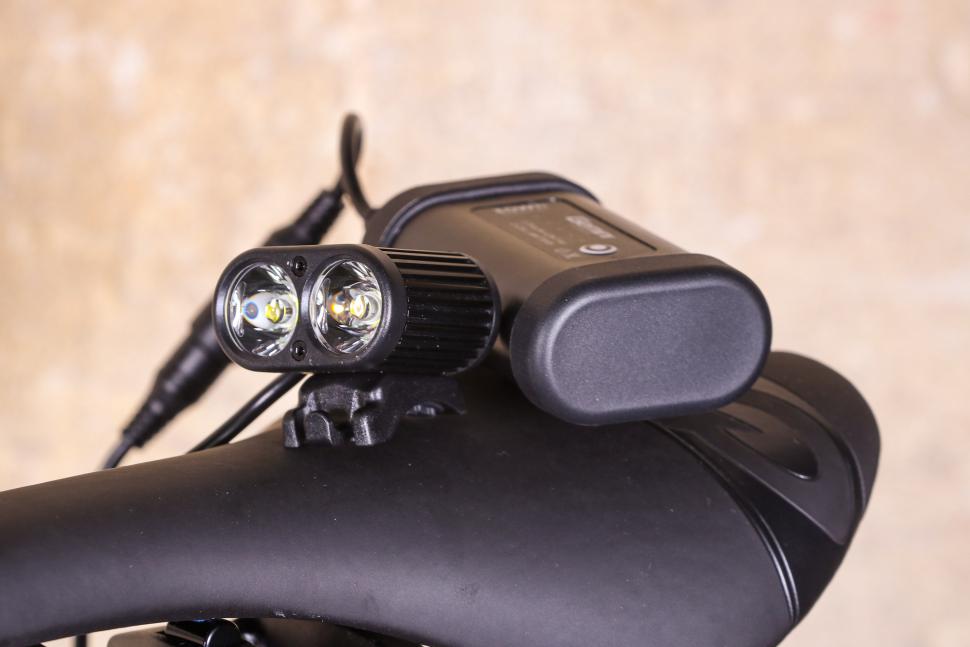

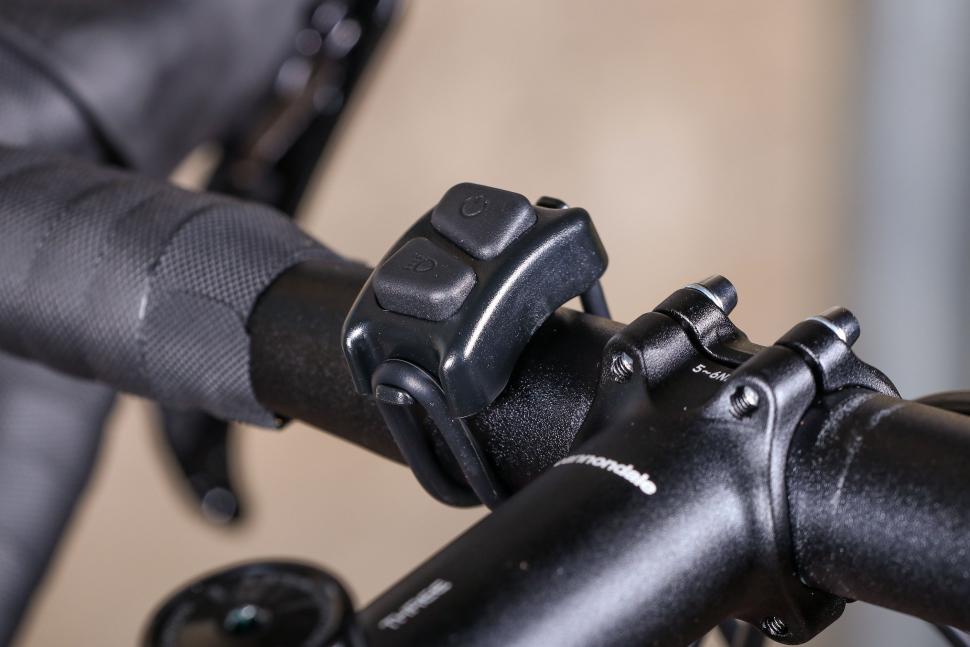
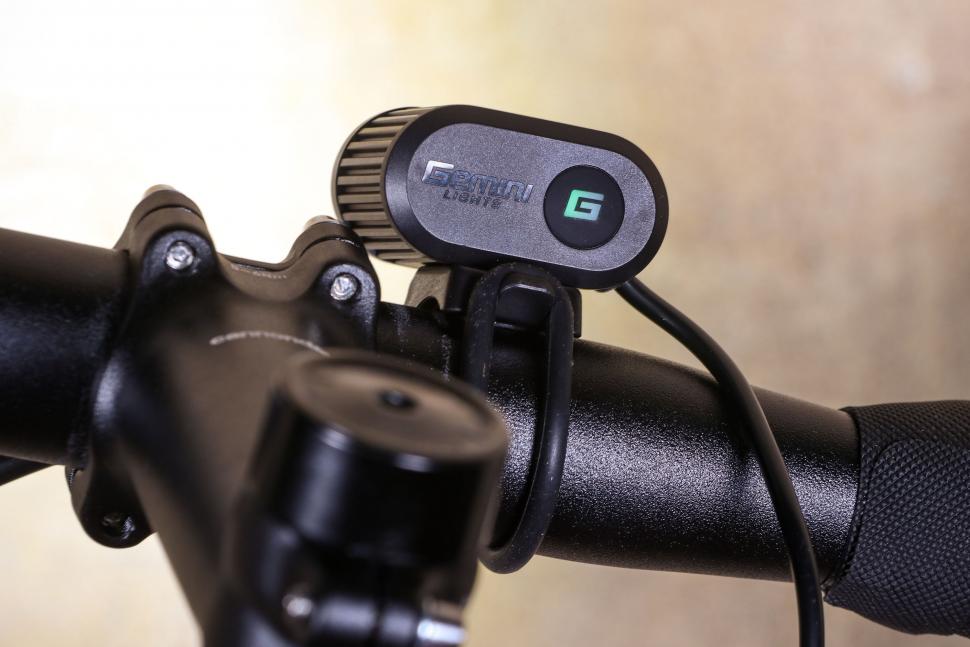
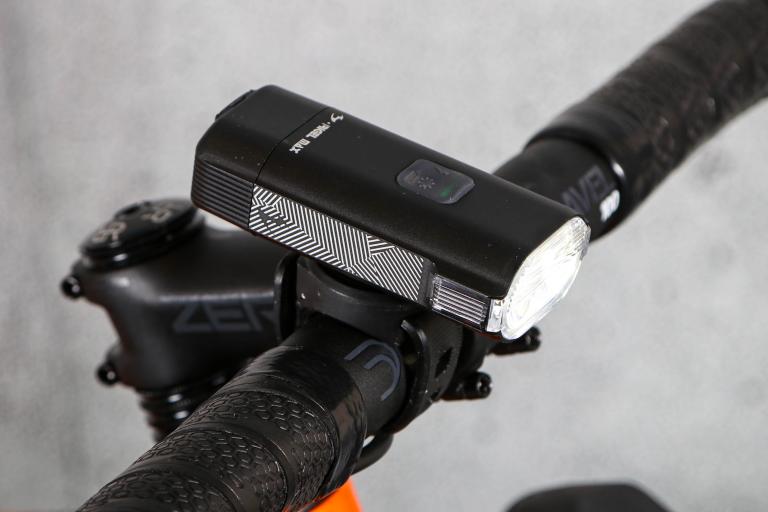
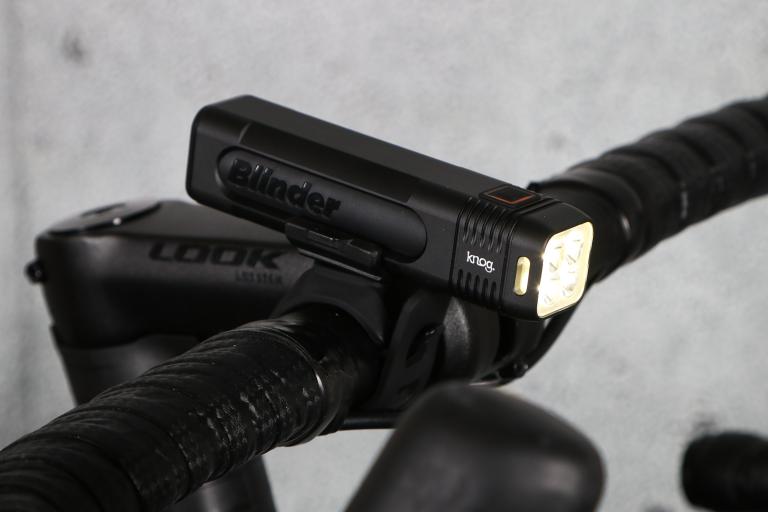
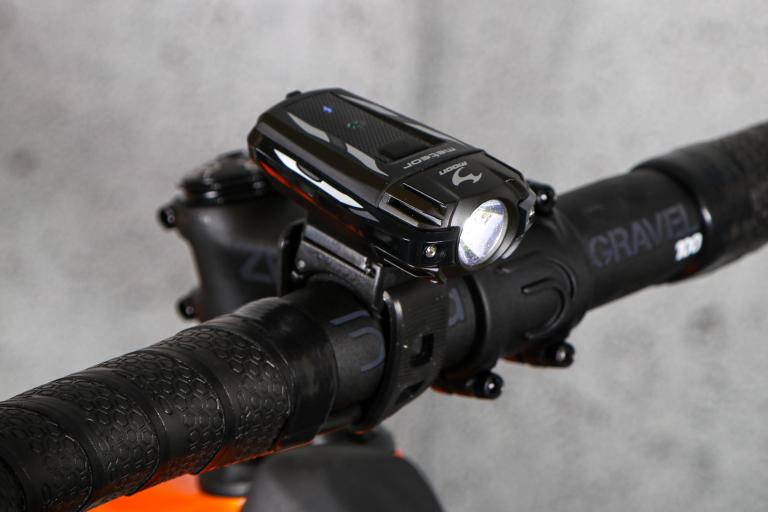
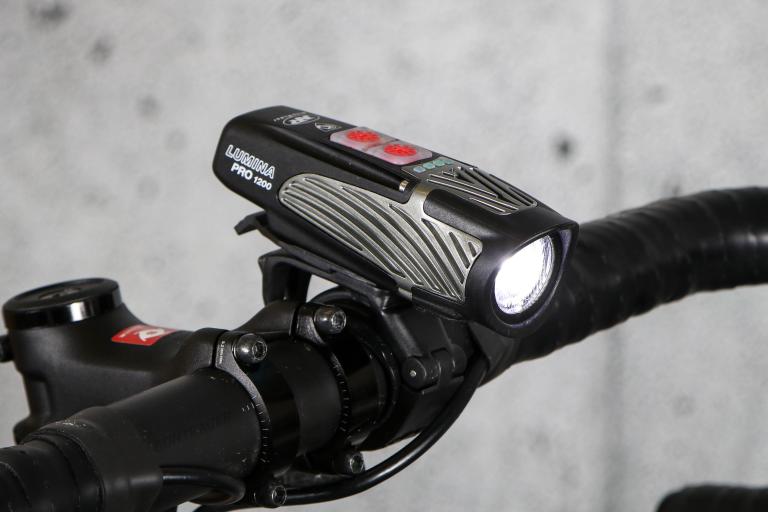
Add new comment
4 comments
Has the guy standing in the test shot stopped seeing the after-image of this light yet? He looks like a cardboard cut-out because with 2200 lumens being blasted at him even the oblique surfaces bounce back enough photons to look like they're face-on. It is utterly ludicrous to describe this as a road-appropriate light.
I'll copy the bit of the review you obviously didnt read:
Battery life is impressive: 2 hours for the maximum 2,200-lumen solid beam, 4.5hrs for medium (1,100 lumens), and 22 for low (220 lumens).
220 lumens inappropriate for road use? Really?
You forgot to mention that this light will overheat and step down if used at the highest setting for more than a couple of minutes. I had one of these a couple of days at the beginning of last summer before I sent it back. Lumen testing I did on it verified its claimed output but measuring the current draw off the battery showed a 3A+ drain so don't plan on getting 2 hr. out of the 4000mAh battery either unless you set it down to around 70%. The Duo is not a good fit for anything other than cooler climates IMO.
I'm sure Welshboy is one of those guys who lease a Gulfstream IV to get fish and chips at the shop down the road. The max output combined with the beam shape is simply ludicrous for any road use. I thought what MRMOLE apparently experienced: overheating followed by stepping down as the thermistor kicks in if you live anywhere but the arctic.